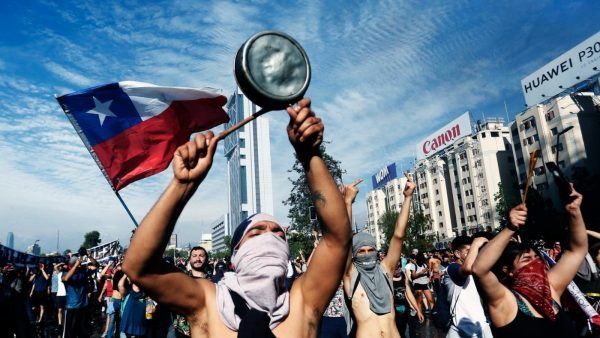Chile has more than four decades of neoliberalism, inaugurated by the civil-military dictatorship (1973-1990). As a consequence of this, different areas of social life (education, health, social security, etc.) have undergone radical processes of privatization and commercialization. In addition, another central aspect of the model has been the intensive exploitation of natural commons such as land, water and minerals to generate economic growth. For several years, Chile showed itself to the world as a successful example of neoliberal policies. Even its conventional politicians, such as the current president Piñera, referred to Chile as “an oasis in Latin America”, reproducing the colonial myth that Chile is an “almost developed”, “almost European” country.
Since 2006, the neoliberal model has been strongly questioned. However, the anti-neoliberal revolt that began in October 2019 would be the highest point of such questioning. The protest that began on October 14 against the rise in the price of the subway in Santiago by high school students, ended up opening a path for a massive demonstration of discontent over the precarious living conditions in Chile. The demands that appear in the revolt are varied; end to market education, no more private pension system, water deprivatization, more and better public health. However, they all have in common their questioning of the pillars of neoliberalism in the country. Transversal to these struggles have been present the feminist struggles that have advocated to combat gender violence and for the end of patriarchy.
We will briefly mention 3 examples of sources of mobilization that have contributed to the characteristics acquired by the October revolt. First, the precariousness of work in Chile, which is deepening with the transformations of the dictatorship and which are beginning to become evident in the long term, especially in the pension system. The pension system was reformed in the 1980s, creating a private led system (AFP in its acronym). A few years ago, people who spent their entire working lives with the 100% private pension system began to retire, receiving a pension that was much lower than their average salary. Currently in Chile, half of all old-age pensioners receive less than $ 186 per month. Then, a movement was generated against the AFPs, which are the companies that manage your pension funds and invest them in the stock market.
The second aspect that is the best known is the student movement. The movement had been in force since 2006, but they achieved a consolidated force in 2011 with the large mobilizations against profit in education. Young people in Chile have raised questions about the commodification of education, and neoliberalism as a whole, precisely because of the harsh consequences that debt to study generates in their families.
A third force is the mobilizations against the dispossession of the territories, related with extractivism as one of the pillars of neoliberalism in Chile. This was understood early by some groups, such as the Mapuche people in Chile in the year 90 and emerged with great force in the denunciation of forest extractivism. And above all it appears in the last decade due to different socio-environmental problems that have worsened. There are also conflicts related to agribusiness, energy and mining, among others. Conflict begins to increase and there are very strong mobilizations in Chile, around the consequences that neoliberalism has in the territories.
Another important component of the post-October 2019 mobilizations is the emergence and strengthening of the territorial organization. After the first mobilizations, different territorial assemblies began to emerge in different parts of Chile that were dedicated to strengthening the organization of the mobilization, dealing with state repression, and discussing political proposals for a life “beyond neoliberalism”. This powerful process of rebuilding the social organization was discouraged by two factors: 1) an agreement “from above” calling for a constituent convention in charge of drafting a new constitution under the conditions imposed by the political parties and 2) the covid-19 pandemic that led to strong confinements that made it difficult to organize the assemblies. Although many assemblies ceased to function, a minority part managed to maintain from its reinvention, mainly its action to face concrete problems of precariousness of life in pandemic (solidarity networks, community food supply, popular preventive health, etc.).
A separate mention is necessary to explain one of the most permanent struggles and has had greater dynamism and prolongation: the struggle of the Mapuche people. The territorial claims of the Mapuche people go beyond neoliberalism and have to do with the centuries of colonial occupation that have stripped them of their territories and denied their ancestral knowledge. The current face of dispossession is the action of forestry companies, agro-exports and hydroelectric plants. In 2019, the Mapuche movement manifested itself in various spaces of the ancestral Mapuche territory, through various occupations of lands, mainly dedicated to forestry activity or the generation of hydroelectric projects. Many of these occupations are not linked to the state institutionality created for these purposes in 1992 (National Indigenous Development Corporation), but are developed by putting into practice the principles of autonomy and territorial control. We have witnessed that although the social protest that began in October is not a process led by the Mapuche people, it has opened political opportunities to increase the processes of land recovery (which had already been in force since the murder by the State of the Mapuche community member Camilo Catrillanca in 2018). According to data, between January and April 2020 there were 17 land recoveries, while in the same months of this year 2021 there were 134 recoveries.
Conservative reaction
The intensity of the mobilizations between October 2019 and March 2020, in addition to the force to challenge the foundations of neoliberalism, has led sectors of the country’s economic-political elite to assume a strong defense of the current model. In addition to using a discourse of criminalization towards those who came out to protest during those months, the main business groups (such as the Confederation of Production and Commerce and the National Society of Agriculture) have been strong detractors of the development of a new constitution and recognize the demands of the protesters, under the argument that the “far-left” could block the development of the country if a new constitution is approved that seeks to change the foundations of neoliberalism.
The conservative reaction has pushed for the increase of state measures of persecution, criminalization and repression of those who have participated in the social uprising in Chile. Examples of these measures are the law that modifies the penal code to establish penalties in cases of alteration of the “public order” (called “anti-looting law”), and the presidential initiative that seeks protection by the armed forces of the “critical infrastructure” of the country.
These measures represent a deepening of the state tendency to respond with repression to the mobilization that emerges from territorial conflicts. In this context, the pandemic declared by covid-19 came to justify and reinforce control with the excuse of the health crisis. Two years after the October rebellion, this worrying trend that calls for the restoration of order and security has gained space in the ideological dispute of common sense. This is expressed in the high vote of the far-right candidate José Antonio Kast, who obtained 27.9% in the first round of 2021 (compared to the 7.9% that he obtained in 2017). Kast within his main promises offers to “restore peace” to the country, punish “violent and terrorists” who disturb public order.
The Mapuche territory (Wallmapu) has received special treatment, as a historic border of a “permanent state of exception”, where the militarization of Wallmapu was reinforced. In this year 2021, 2 Mapuche community members have been assassinated by state agents in protest actions. The government declared a “constitutional state of emergency of emergency” in the regions where the main Mapuche mobilizations are taking place. In addition, the historical discrimination and racism towards the Mapuche people is now reinvented under the drug-dealing discourse as a way of delegitimizing Mapuche claims (Mapuche organizations are accused of being narco-terrorists).
The anti-neoliberal struggle in a labyrinth?
The outlook in Chile is uncertain after 2 years of the biggest social upheaval in the last 35 years. The energy mobilized in the streets and the hopes on the faces of millions who came out of their homes to protest made us believe that a change in the social order was possible and even close. However, the weakening of the mobilization and territorial organization together with the recent electoral advance of the far-right, has made several analysts manifest that the airs of rebellion are in retreat.
A weakening factor in the mobilization has been the institutionalization process that the establishment has repeatedly sought. The creation of the constitutional convention, although it includes part of the popular demands and includes representatives of social movements and the revolt, has been an attempt to channel the unrest and seek to generate consensus that legitimizes an order. The stage is still open within the constituency, because there are sectors within it that are fighting to achieve a new constitution that can be the beginning to bury neoliberalism. However, a concrete effect is that the main contest has moved to that space for a part of the social movements and territorial assemblies that led the revolt.
In addition to the convention, in the last year there has been strong pressure due to the electoral calendar. We have experienced successive elections for popularly elected positions (constituents, regional governors, mayors, councilors, regional councilors, deputies, senators, president). It has been an “electoral bombing” that has led to broad sectors of the left being primarily concerned with the timing of “politics from above”, which has weakened the territorial organization. The last election, and the one that generates the most anxieties, is the run for president that confront Gabriel Boric (who represents the Broad Front, the Communist Party and other left-wing forces) and José Antonio Kast (Christian Social Front, which groups together far-right sectors). Boric comes to the contest declaring that he seeks to end neoliberalism based on a social-democratic program that looks at the experiences of Western Europe (especially the Nordic countries). His speech is increasingly softened to seek the “political center”, reading that an important part of the country does not want major shocks and yearns for tranquility after 2 convulsed years. Kast, for his part, has sought to reflect the spirit of “peace and order” in an alliance of revival Pinochetism, religious fundamentalisms, and ultra-liberal economics.
Beyond the recent electoral result, the political scene of the governments is highly volatile. In the case of a Kast victory, something important about his political project is that it has no future projection (1). There are no promises of a “new project”, as the neoliberals did in the 1980s and 1990s. His bet is that “force will come and put order.” His economic proposals are an overloaded version of neoliberalism coupled with greater cultural conservatism. But the restoration effort is an illusion in a world and a Latin America that is increasingly in turmoil. The precariousness that the pandemic has generated and the economic crisis projections make it difficult for overloaded neoliberalism to contain the claims for justice, the hunger, the fight against violence and inequality.
If there is something that October 2019 has taught us in Chile, it is that there is a social volcano that exploded and may explode again, because the wounds that emerged are still open. It will be up to the social movements and indigenous groups in Chile to find ways for this volcanic force to lead us to transformative horizons.
Alexander Panez studied Social Work at the University of Valparaiso and Urban Planning at the University of Chile and received his PhD in Geography from the Universidad Federal Fluminense, Brazil https://ubiobio.academia.edu/AlexanderPanez
Boric emerged victorious from the runoff election in December 2021; he will take over as President on March 11th.

